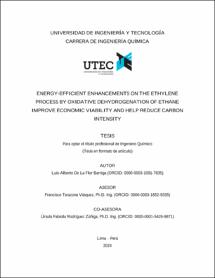| dc.contributor.advisor | Tarazona Vásquez, Francisco | |
| dc.contributor.advisor | Rodríguez Zuñiga, Ursula | |
| dc.contributor.author | De La Flor Barriga, Luis Alberto | |
| dc.date.accessioned | 2024-05-22T22:04:21Z | |
| dc.date.available | 2024-05-22T22:04:21Z | |
| dc.date.issued | 2024 | |
| dc.identifier.citation | De la Flor-Barriga, L. A., Rodríguez-Zúñiga, U. F., and Tarazona-Vasquez, F. (2024). Energy-Efficient Enhancements on the Ethylene Process by Oxidative Dehydrogenation of Ethane Improve Economic Viability and Help Reduce Carbon Intensity. Industrial & Engineering Chemistry Research, 63(12), 5367-5379. https://doi.org/10.1021/acs.iecr.3c04201 | es_PE |
| dc.identifier.uri | https://hdl.handle.net/20.500.12815/372 | |
| dc.description | Artículo sustentado el 16 de mayo 2024 para la obtención del título profesional de Ingeniero Químico. | es_PE |
| dc.description.abstract | Ethylene is a fundamental feedstock for the petrochemical industry. Globally, most production of ethylene is carried out by steam cracking of oil and gas at high temperatures (500–1100 °C). This is a well-established technology with a high environmental impact, relatively low yield, and a wide range of byproducts. In recent years, oxidative dehydrogenation (ODH) of ethane has been investigated as an alternative to achieve a more sustainable route through lower reaction temperatures (<500 °C) and hence lower energy consumption. This study consists of a comprehensive evaluation of an ODH plant design for ethylene production at a capacity of 500 kt/year. Two key process enhancements were applied using process simulation: heat integration with a refrigeration system and energy recovery through a Rankine cycle. Furthermore, an economic sensitivity analysis was performed to assess the impact on NPV by varying the feedstock cost, product selling price, CAPEX, OPEX, and capacity utilization for a range of plant sizes from 250 to 1000 kt/year.
As a result, the design showed its robustness to ethane price variation, up to 134% increase. However, it was sensitive to ethylene price variation, up to 23% decrease. It also showed up to 8% OPEX savings with respect to the base design. The NPV was increased by 33% when applying the enhancements. In the environmental aspect, a 42% reduction in carbon intensity was achieved when compared to steam cracking, and the E-factor was 0.7 kg of waste per kg of producto. | es_PE |
| dc.description.abstract | El etileno es una materia prima fundamental para la industria petroquímica. A nivel mundial, la mayor parte de la producción de etileno se lleva a cabo mediante el craqueo de vapor del petróleo a altas temperaturas (500-1100 °C). Se trata de una tecnología establecida con un alto impacto ambiental, un rendimiento relativamente bajo y una gran variedad de subproductos. En los últimos años, la deshidrogenación oxidativa (ODH) del etano se ha investigado como una alternativa para lograr una ruta más sostenible a través de temperaturas de reacción más bajas (<500 °C) y, por tanto, un menor consumo de energía. Este estudio consiste en una evaluación integral del diseño de una planta ODH para la producción de etileno a una capacidad de 500 kt/año. Se aplicaron dos mejoras clave en el proceso mediante la simulación de procesos: integración de calor con un sistema de refrigeración y recuperación de energía mediante un ciclo Rankine. Además, se realizó un análisis de sensibilidad económica para evaluar el comportamiento del VAN variando el costo de la materia prima, el precio de venta del producto, CAPEX, OPEX y la utilización de la capacidad para una variedad de tamaños de plantas de 250 a 1000 kt/año. Como resultado, el diseño mostró su robustez ante la variación del precio del etano, hasta un 134% de aumento.
Sin embargo, fue sensible a la variación del precio del etileno, a una disminución de hasta un 23%. También mostró hasta un 8% de ahorro en OPEX con respecto al diseño base. El VAN se incrementó en un 33% al aplicar las mejoras. En el aspecto medioambiental, se logró una reducción del 42% en la intensidad de carbono en comparación con el craqueo de vapor, y el E-factor fue de 0,7 kg de residuo por kg de producto. | es_PE |
| dc.description.uri | Tesis | es_PE |
| dc.format | application/pdf | es_PE |
| dc.language.iso | eng | es_PE |
| dc.publisher | Universidad de Ingeniería y Tecnología | es_PE |
| dc.rights | info:eu-repo/semantics/closedAccess | es_PE |
| dc.rights.uri | http://creativecommons.org/licenses/by-nc-nd/4.0/ | |
| dc.source | Repositorio Institucional UTEC | es_PE |
| dc.source | Universidad de Ingeniería y Tecnología - UTEC | es_PE |
| dc.subject | Energy | es_PE |
| dc.subject | Hydrocarbons | es_PE |
| dc.subject | Manufacturing | es_PE |
| dc.subject | Separation science | es_PE |
| dc.subject | Water | es_PE |
| dc.title | Energy-efficient enhancements on the ethylene process by oxidative dehydrogenation of ethane improve economic viability and help reduce carbon intensity | es_PE |
| dc.type | info:eu-repo/semantics/bachelorThesis | es_PE |
| dc.subject.ocde | https://purl.org/pe-repo/ocde/ford#2.04.01 | es_PE |
| dc.publisher.country | PE | es_PE |
| thesis.degree.discipline | Ingeniería Química | es_PE |
| thesis.degree.grantor | Universidad de Ingeniería y Tecnología. Ingeniería Química | es_PE |
| thesis.degree.level | Título profesional | es_PE |
| thesis.degree.name | Ingeniero Químico | es_PE |
| dc.identifier.doi | https://doi.org/10.1021/acs.iecr.3c04201 | |
| dc.identifier.journal | Industrial & Engineering Chemistry Research | es_PE |
| renati.advisor.dni | 10295752 | |
| renati.advisor.dni | 29722081 | |
| renati.advisor.orcid | https://orcid.org/0000-0003-1852-9335 | es_PE |
| renati.advisor.orcid | https://orcid.org/0000-0001-5426-9871 | es_PE |
| renati.author.dni | 71888677 | |
| renati.author.orcid | https://orcid.org/0000-0003-1091-7835 | es_PE |
| renati.discipline | 531026 | es_PE |
| renati.juror | Araujo Pantoja, Patricia | |
| renati.juror | Figueroa Jachilla, Vanessa | |
| renati.juror | Rodríguez Zuñiga, Ursula | |
| renati.level | http://purl.org/pe-repo/renati/level#tituloProfesional | es_PE |
| renati.type | http://purl.org/pe-repo/renati/type#tesis | es_PE |





